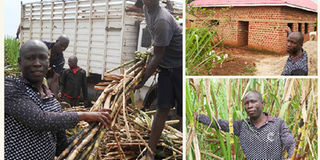He has earned a fortune from sugar

Above, Mukalazi and workers load a harvest of sugarcane on a truck. Above right, a house he has built from his earnings. Top, in his sugarcane garden. pHOTOS BY JOHNSON MAYAMBA.
Samuel Mukalazi, a resident of Ssugu village in Buikwe District, is now a sugarcane farmer. He previously dealt in local brew, a business he thought would earn him a living for the rest his life.
That was until his customers started drinking the brew on credit and default on payment. This continued to happen until he could not handle making losses on a daily basis. This was in the early 1990s.
In 1996, after failing to make enough money, he quit brewing business and used the savings he had to invest in growing sugarcane.
Mukalazi did not have land at the time to start such a venture. With advice from his friends, he searched for people who had redundant land that he could rent. “I approached some of the landlords around and one agreed to rent me land. I had only Shs100,000 which was not enough money for my start up for such a project at the time,” he recalls.
He says after getting the land, he then approached Sugar Corporation of Uganda Ltd (SCOUL) in Lugazi, Buikwe District to lend him money to top up. They agreed and gave him a loan of Shs640,000 for his venture.
Starting out
“I signed a contract with them to pay after selling the first harvest. After acquiring the money, I went back to the landlord and paid him Shs50,000 on the first acre I was testing my venture on,” he says.
On the remaining money, he bought seedlings and also paid workers to help him. He says at the end of the first harvest, he was able to make over Shs1.2m which he used to pay back the loan and also remained with Shs480,000 as his profits.
“After the first harvest that was successful, I was encouraged to register with the company as an out grower which I did. I remember having my cow which I sold at Shs400,000 and topped to the profits I had made. With a total of Shs880,000, I rented more land from one acre I had to six acres,” he narrates.
After realising that the money would not be enough, he approached the manager of SCOUL, Robert Alego, who later talked with the rest of the members at the company on his behalf.
“Seeing that I had potential, they agreed to lend me more seeds and assisted me with their tractor to clear the land. That encouraged me to continue investing in the project because I already had market for them in the company which was also willing to help me succeed,” Mukalazi says.
The idea that turned into a visible project is now earning him a fortune. He thinks people can always succeed at anything they determine to do if they have passion, commitment and perseverance.
“I advise people in Buikwe and surrounding areas that if you have land that you are not using, it is high time you use it or rent it out to those willing to make good use of it. If you have no land but would like to do this kind of farming, look for landlords with land and rent it,” he notes.
Benefits
He adds that SCOUL is willing to help committed farmers in any way from clearing the land to harvesting. An acre costs Shs650,000 in growing the plants but when they are looked after well, one can reap over Shs2m. He says after delivering the harvest to SCOUL, the company weighs the sugarcanes and they pay Shs62,800 per tonne.
Every acre of land can bring in between 10 and 14 tonnes. If you don’t have your own land, an acre is rented between Shs50,000 and Shs60,000 for four seasons. Now, he does not think of any other work as this is giving him the kind of life he always hoped for.
“My business expands every year. Currently, I rent 30 acres of land where I make a minimum of Shs20m in a good season,” he says..
From the proceeds, he says he is in position to pay for his children’s education, build a house and buy two trucks to help him on the farm. “Aside from using the trucks on my farm, I also use it to help other out grower farmers transport their harvests from the farm to the company. The biggest challenge with this kind of farming is the long dry seasons that affect the proper growth of the sugarcanes. When it is so dry like it is now, the sugarcanes can easily burn especially from the fire started by other people,” he explains.




